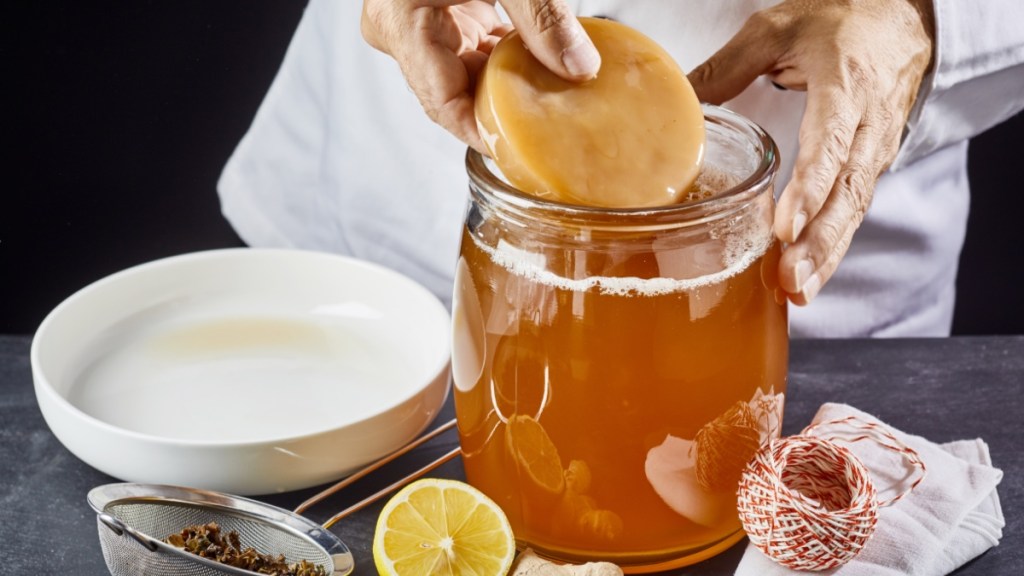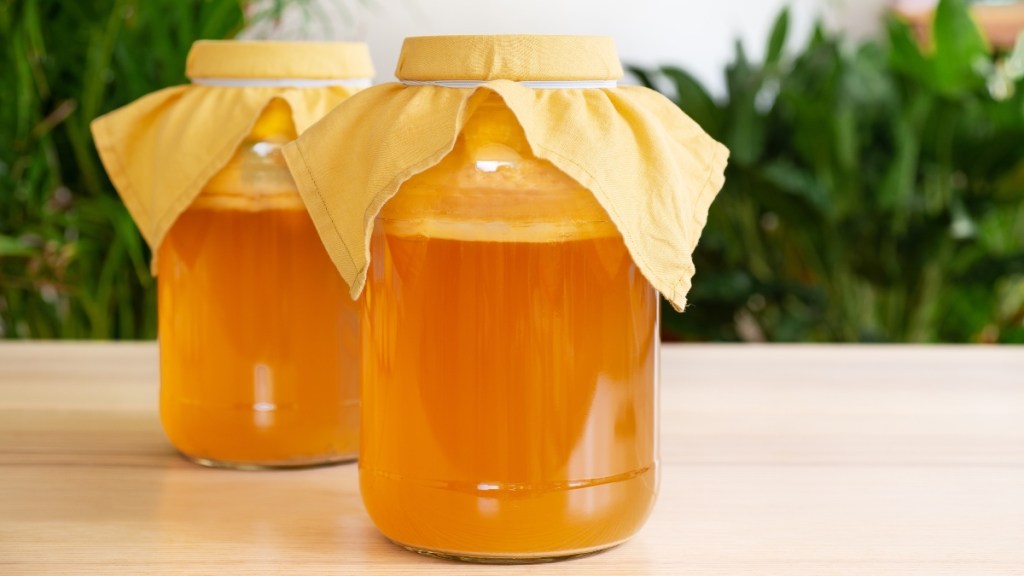Benefits of Kombucha for Women: The Delicious Sparkling Tea Can Heal Your Gut and Speed Weight Loss
There's a reason kombucha has taken the natural health world by storm — here's what you need to know

Have you heard the buzz about kombucha? We wouldn’t be surprised if you had — kombucha’s popularity has spiked astronomically over the past decade, making it one of the fastest-growing grocery sectors of the moment. Today, you can find the fizzy fruit drink in almost every grocery store, many coffee shops, and even offered on tap in breweries and bars. Its rising popularity is largely thanks to the total-body health benefits kombucha delivers, including improved gut and liver health, impressive cholesterol-lowering benefits and weight loss. Which all begs the question: What exactly is kombucha, and how does it provide such wide-ranging health benefits for women? Let’s dive in.
What is kombucha?
“Kombucha is basically fermented tea,” explains David Perlmutter, MD, a board certified neurologist and author of Brain Maker. (Buy from Amazon.com, $23.42) And while kombucha might be trending now, this fermented drink has actually been around for centuries. In fact, it’s been lauded for its positive effect on the immune system and overall health since as early as 220 BC. Indeed, it’s taken over 2,000 years for the fizzy tea to become commercially successful.
Part of the reason for the lag time is that the concept behind kombucha sounds bizarre — it’s made through a fermentation process involving a microbial culture called a SCOBY, a cellulose mat that houses a symbiotic culture of bacteria and yeast. (It’s a similar concept to sourdough starter.) Over the course of a few weeks, the SCOBY is fermented in sweetened tea until it reaches the ideal balance of carbonation, alcohol content, and that distinctive sweet, sparkling tea juice taste.
If drinking a glass of fermented bacteria and yeast doesn’t exactly sound like your cup of tea, sit tight. For many people, the main appeal of kombucha isn’t the taste but the myriad health benefits that may come from drinking it.
What are the benefits of kombucha for females?
Kombucha health benefit: dramatically improved digestion
As we get older, constipation and bloating seem to become more and more frequent. This isn’t unusual — changes in the digestive system come with age, and can quickly become a part of your everyday life. Still, this doesn’t make those stomach pains and GI troubles any easier to deal with. That’s where kombucha comes in: “Kombucha supplies healthy probiotics when consumed,” explains Dr. Perlmutter. “The health promoting effects include reducing inflammation and improving antioxidant activity.”
Not only does this aid digestion, but it also bolsters your overall gut health. That’s because those probiotics can help support the health of your stomach and intestinal cells, maintain a healthy inflammatory response, and generally help the body do what it’s supposed to do when it comes to digesting food.
“Probiotic bacteria living in the gut are fundamentally important for digestive health and function,” says Dr. Perlmutter. “And many of the important types of bacteria that aid in the gut are found in kombucha.” What’s more, drinking kombucha (along with consuming other types of fermented foods) supplements the work of those naturally-occurring bacteria in your gut, boosting the healthy effects.
Kombucha health benefit: effortless weight loss
Smooth sailing in the bathroom isn’t the only thing kombucha’s probiotics can help. It can also support weight loss. It all goes back to those healthy bacteria, which can break down fiber, influence appetite, and regulate fat absorption. In other words, probiotics can help ensure that your body absorbs as much of the good stuff and as little of the bad stuff as possible — and that you feel fuller for longer. Dr. Perlmutter’s thoughts? “Probiotics, in my opinion, should be considered as a central part in any comprehensive weight loss program.”
Related: Kombucha Helps Ward Off Yeast Infections Says Ob/Gyn
But probiotics aren’t the only ingredient in kombucha that can support weight loss. If the SCOBY is fermented in green tea, the resulting kombucha will contain many of the same plant compounds — and health benefits — as green tea. Specifically, it will be packed with antioxidants like polyphenols, which can increase the number of calories you burn. “The products produced by probiotics have a direct effect in terms of reducing appetite,” Dr. Perlmutter adds, so keep an eye out for green tea-based kombucha if you’re trying to shed a few extra pounds.

Kombucha health benefit: help for fatty liver disease
Research in the International Journal of Molecular Science done on rats suggests that the antioxidants in kombucha may help reduce liver toxicity and fight free radicals, molecules that disrupt the way our bodies are supposed to work. Health experts commonly discuss the antioxidants in foods like blueberries, raspberries, kale, and dark chocolate. But kombucha has been shown to provide a health boost, too. In the study, researchers found the fermented drink reduced the effects of a condition known as non-alcoholic fatty liver disease, in which the liver accumulates too much fat. (Click through to find more simple ways to prevent non-alcoholic fatty liver disease.) In other research, scientists have found that kombucha can help repair damage done to the liver by the pain-killer acetaminophen.
Kombucha health benefit: higher “good” cholesterol + lower “bad” cholesterol
Relaxing with a glass of kombucha is a simple way to ward off cholesterol trouble. Credit goes to the healthy green tea that some kombucha’s are brewed with. The drink is packed with beneficial compounds like polyphenols and antioxidants, explains Dr. Perlmutter. This can lift levels of your “good” HDL cholesterol. Green tea, and therefore kombucha fermented in green tea, can also help prevent cholesterol particles from oxidizing, which helps keep levels of “bad” LDL cholesterol in check.
Kombucha health benefit: Steadier blood sugar
Keeping your blood sugar level on an even keel wards off energy dips, mood swings and diabetes. And kombucha can help do just that. That’s because the fermented drink regulates the absorption of carbs and keep blood sugar levels steady after meals, according to research out of the University of Sydney.
How do you make kombucha?
One of the best parts about this health-boosting elixir is that you can buy pre-made kombucha in grocery stores if you’re short on time, or you can make it at home over the course of a few weeks for a fraction of the price.
Step one: Make the SCOBY
The first step in crafting your homemade kombucha is to buy or make a SCOBY. This is the combination of bacteria and yeast that kickstarts each batch of kombucha. You can purchase one such as Fermentaholics Kombucha Live SCOBY Starter (Buy from Amazon.com, $13.49), or you can make it yourself. Here’s what you’ll need:
- 7 cups of water
- ½ cup of white sugar
- 4 bags of caffeinated black tea
- 1 cup of unflavored and unpasteurized kombucha
- A cheesecloth or coffee filter
- Rubber bands
To make a SCOBY, you first need to make sweet tea. Boil the water in a large saucepan, then remove it from the heat and add the sugar, stirring gently until it’s dissolved. Next, add the tea bags and steep for at least 20 minutes before letting the water cool to room temperature. Pour the cooled tea into a large jar, then add the store-bought kombucha. Cover with a cheesecloth or coffee filter and secure with rubber bands. Leave the jar somewhere at room temperature in the dark for one to four weeks until the SCOBY has formed. You’ll know it’s ready when you see a ¼ to ½ inch layer at the top of the jar. Stick to caffeinated black tea to start, since it will grow your SCOBY best. You can make kombucha with other types of tea after you’ve got a strong batch of SCOBY.

Step two: Make the Kombucha
Once you have your SCOBY, it’s time to ferment your first batch of kombucha. First, make a batch of sweet tea, just like you did above when growing your SCOBY. (This time, it’s okay to use green tea if you want!) Then, remove your SCOBY and two cups of the liquid it grew in (known as your “starter” kombucha) before emptying the remainder of the jar. Add your new sweet tea, the starter kombucha, and your SCOBY into the jar.

Cover and seal the jar once more and let it ferment in the dark for six to 10 days. At six days, you can begin taste-testing your batch until you’ve reached the desired level of sweet and vinegary flavor. The final step is a second fermentation, and you’ll need canning jars for this. Add the kombucha you’ve made so far to these jars, along with 1 to 2 Tbs. of fruit juice and 1 to 2 tsp. of sweetener for every cup of kombucha. Bottle, seal, and ferment this mixture for another three to 10 days. After that, you’re ready to enjoy your creation!
Prefer a video guide? Check this one out:
What other fermented foods can improve your health?
Many of the health benefits of kombucha come from the fermentation process, which packs this fizzy drink full of probiotics. But kombucha isn’t the only food made this way. There are two other popular fermented foods out there that give your body a health boost, and they can be found right in the aisles of your grocery store.
Kimchi
If you’ve ever had Korean food, chances are you’ve eaten kimchi. This seasoned and fermented cabbage is a traditional Korean dish and a weight loss superstar, thanks to its low-calorie, nutrient-rich nutritional profile. “It’s a superfood,” says Dr. Perlmutter. In addition to weight loss, “the science supporting the health benefits of kimchi is extensive and includes association with better colonic health, reduced constipation, cholesterol reduction and even promotion of skin health.”
Related: Is Kimchi a Superfood? Yes! The Korean ‘Sauerkraut’ Is a Natural Probiotic Goldmine
In fact, just one serving of kimchi includes vitamins B6, C and K, folate, iron, niacin, and over 34 amino acids. And that’s not even counting all the health benefits of the probiotics gained through fermentation.

Sauerkraut
Kimchi isn’t the only type of fermented cabbage you can eat. Sauerkraut, a traditional dish made by shredding and fermenting cabbage in lactic acid bacteria, also offers several health benefits. “Like kimchi, sauerkraut consumption has been associated with a variety of health benefits,” Dr. Perlmutter notes.
Sauerkraut is a rich source of probiotics and helps support a healthy gut microbiome. The fermented veggie is also packed with vitamins C and K, fiber, and antioxidants, all of which contribute to a strong immune system.
Plus, sauerkraut has a unique and tangy taste, making it a great addition to many dishes. You can layer it into a sandwich, toss it on a salad, eat it with brats, mashed potatoes, or meatballs, or add it to a rice bowl.
For more on kombucha, check out these stories:
6 Ways Drinking Refreshingly Tart Kombucha Tea Can Benefit Your Overall Health
Can Kombucha Make Menopause Symptoms More Manageable? We Asked the Experts
For more ways to improve your gut health, check out these stories:
Benefits of Kombucha for Women: The Sparkling Tea Can Heal Your Gut, Speed Weight Loss
Never Buy Probiotics Again — Make Yogurt At Home and Boost Your Gut Health
6 Low Sugar Fermented Foods Proven to Dramatically Improve Gut Health
This content is not a substitute for professional medical advice or diagnosis. Always consult your physician before pursuing any treatment plan.













